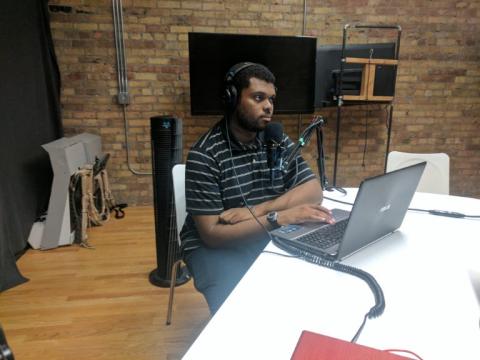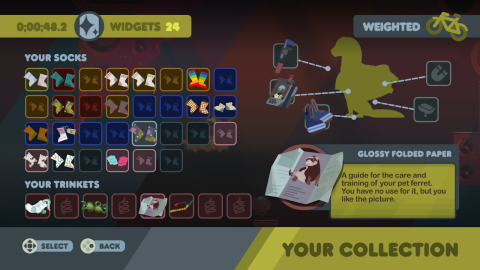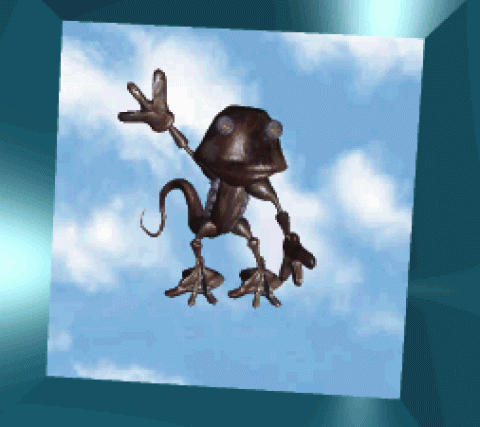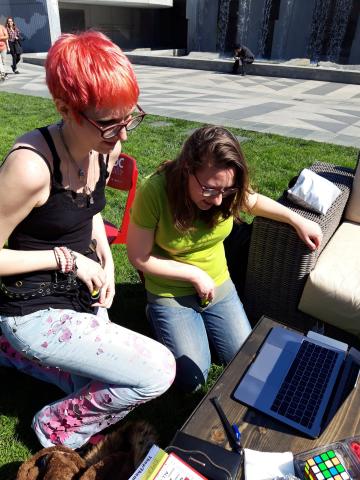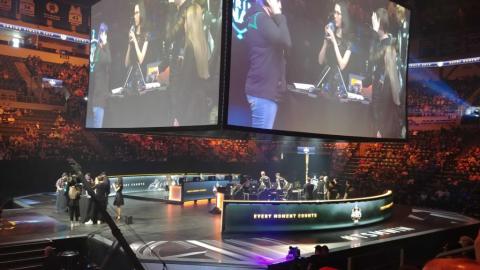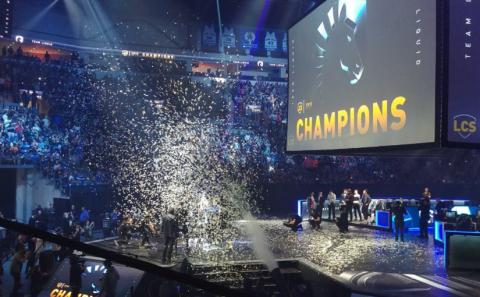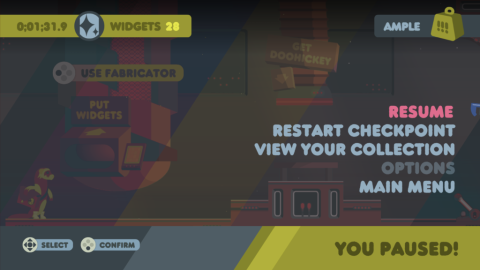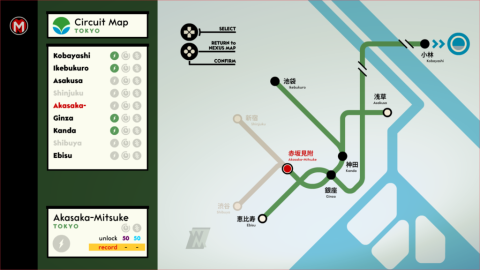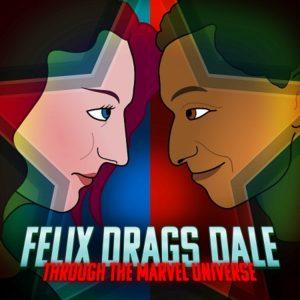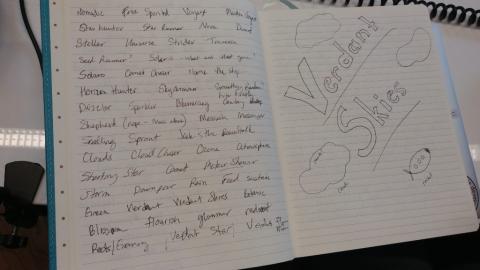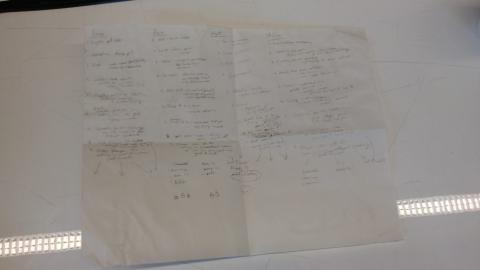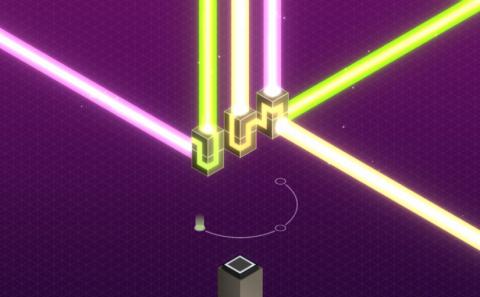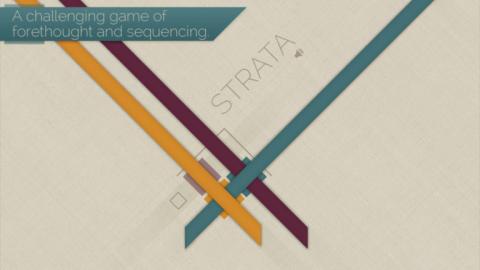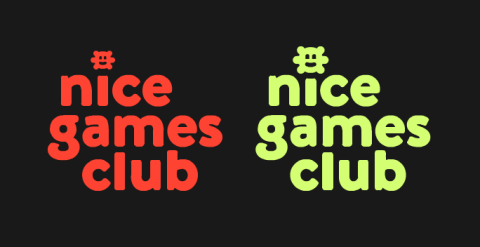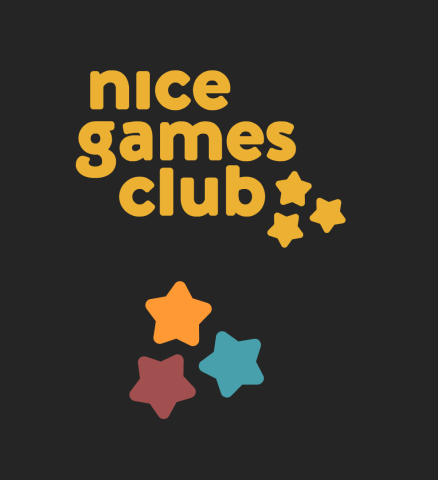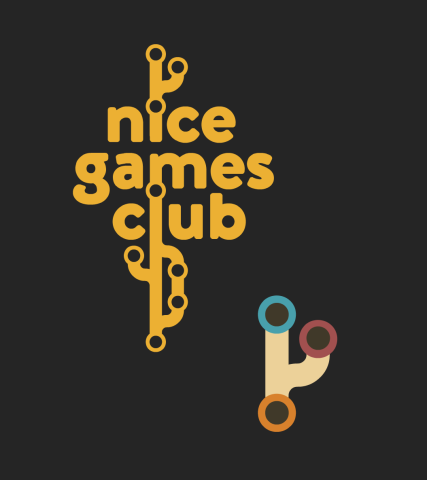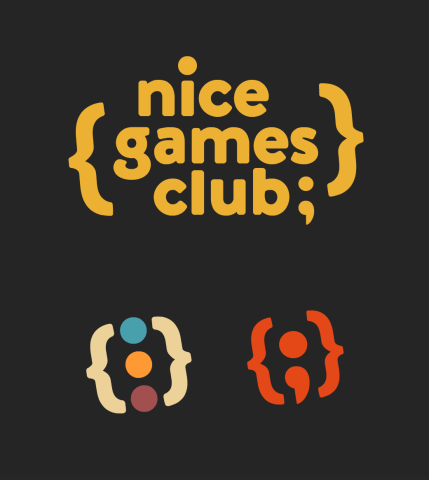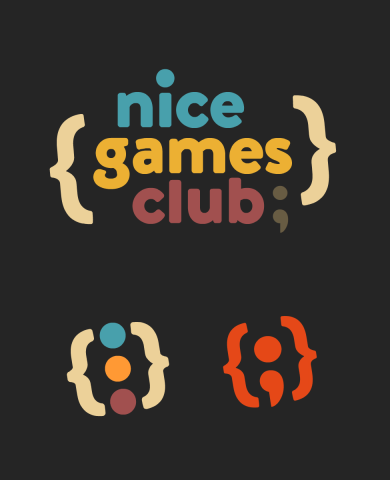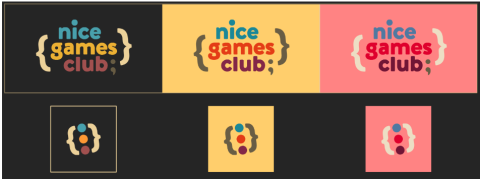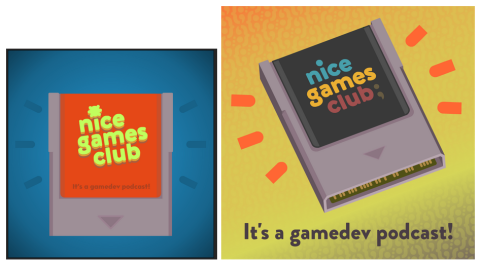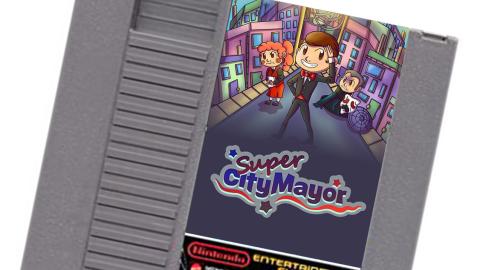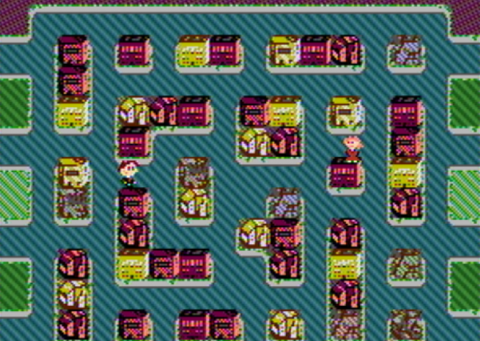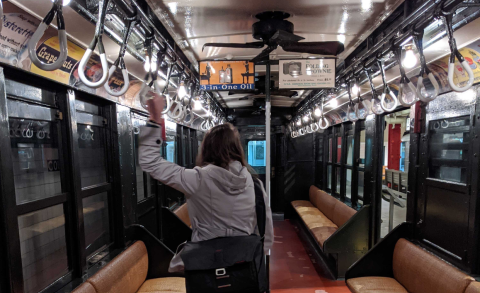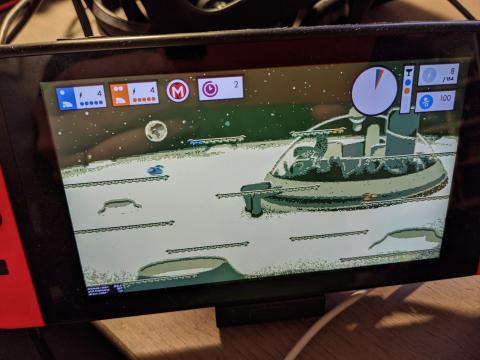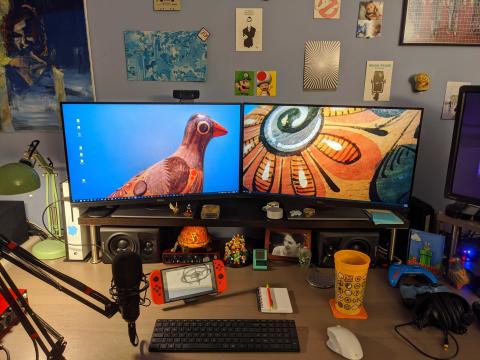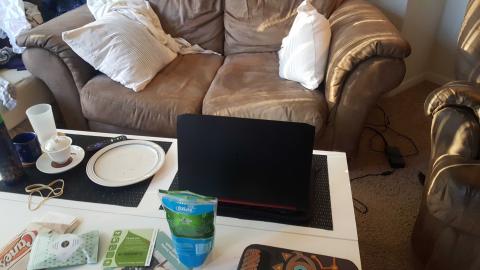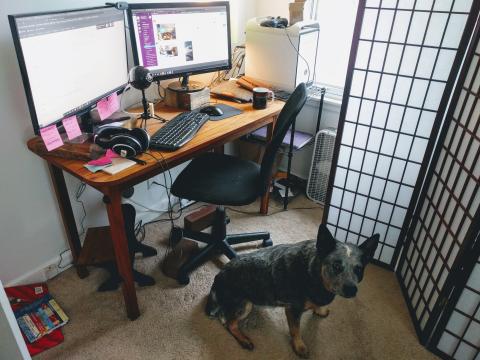Our 10th(!!!) episode has your nice hosts teetering on the edge of not-so-niceness as they each describe something they just don't get (or don't quite like) in gaming, and hope the other two can bring them around.

Nice Games Club - a gamedev podcast! (Ellen, Stephen, and Mark)
Explorez tous les épisodes de Nice Games Club - a gamedev podcast!
Plongez dans la liste complète des épisodes de Nice Games Club - a gamedev podcast!. Chaque épisode est catalogué accompagné de descriptions détaillées, ce qui facilite la recherche et l'exploration de sujets spécifiques. Suivez tous les épisodes de votre podcast préféré et ne manquez aucun contenu pertinent.
| Date | Titre | Durée | |
|---|---|---|---|
| 23 Nov 2016 | "We in this." Impostor Syndrome; Gaming Events; VR Development | ||
Holy bolts, our first episode! 0:01:58 Impostor Syndrome0:22:38 Gaming Events0:55:57 VR Development | |||
| 30 Jan 2017 | "Try it once." Watching Games; Narrative in Games; Board Games | ||
Our 10th(!!!) episode has your nice hosts teetering on the edge of not-so-niceness as they each describe something they just don't get (or don't quite like) in gaming, and hope the other two can bring them around. 0:01:28 Watching GamesHuffington Post Rooster Teeth Giant Bomb That Dragon, Cancer 0:13:00 Narrative in Games | |||
| 27 Nov 2018 | "Try it once." Watching Games; Narrative in Games; Board Games [Nice Replay] | ||
| 22 Aug 2018 | "100 times nice." 100th Episode Special | ||
In this episode, your nice hosts celebrate 100 episodes of Nice Games! We reminisce a bit on how the podcast has been going and go behind the scenes on what it takes to release one of the episodes. Thanks for listening to us 100 times! 0:00:27 100th Episode SpecialOur evil counterparts, Evil Games Club, have released two episodes so far... and this one | |||
| 31 Dec 2019 | "100 times nice." 100th Episode Special [Nice Replay] | ||
In this episode, your nice hosts celebrate 100 episodes of Nice Games! We reminisce a bit on how the podcast has been going and go behind the scenes on what it takes to release one of the episodes. Thanks for listening to us 100 times! Our evil counterparts, Evil Games Club, have released two episodes so far... and this one | |||
| 29 Aug 2018 | "Don’t start with me." Pitching to Consoles; Turn-Based RPGs | ||
This week, Mark doesn’t respect your secrets (but will keep them), Martha tells us where D&D really comes from, and Stephen reveals that he will play a Kirby RPG if someone makes one for him. 0:05:11 Pitching to ConsolesPlayStation Information is on the PlayStation Partners site. Your first step is to fill out their company registration page. Xbox Information is on the ID@Xbox site. Before submitting your game, your first step will be to apply to the program with basic information about your company. Nintendo For Wii U and 3DS development, registration is open to all developers on their developer portal. For Switch development, just send them an email! ThirdPartyPublisher@noa.nintendo.com. General Business stuff We talked about starting a business for your game studio in a previous episode. 0:52:15 Turn-Based RPGs | |||
| 06 Sep 2018 | Code Comment: "Verdant Skies" | ||
This week, we look at Verdant Skies, the sci-fi life-simluation game from Howling Moon Software, available now on Steam, Itch, and Humble Bundle! We're joined by two of the game's developers, Andy and Beth Korth, as well as their little one, Gabe. All three are making their second appearances in the clubhouse, as they were the program's very first guests back in our second episode (exactly 100 episodes ago)! We've already booked them for episode 202! Video | |||
| 11 Sep 2018 | "Put it in a WordSpace!" Modding; Self-publishing Must-haves | ||
This week on Nice Games Club your nice hosts talk all about Modding and Self-Publishing Must-Haves. Stephen explains different viewpoints on mod-ownership, Martha goes fishing on easier mode and Mark makes too many gifs. 0:44:30 Self-publishing Must-havesLearn more about how to make a good website on our Website topic in our episode We have had friend of the pod/media relations wiz Holly Harrison on the show to talk about Community Management and Media Relations in our interview episode | |||
| 18 Sep 2018 | "Safety gone!" Hub Worlds and Safe Houses; Environmental Storytelling | ||
This week on the program, Mark starts playing Spider-Man, Stephen ignores your narrative, and Martha is very smart. 0:09:09 Hub Worlds and Safe Houses0:38:20 Environmental StorytellingMark talks about the subtext of Metro Nexus' overworld maps in our episode topic on research for games. | |||
| 25 Sep 2018 | Nice Games Jam: "Ha-Ha!" | ||
This week on Nice Games Club we are trying out a new type of episode: Nice Games Jam! We get a topic from Martha’s boyfriend Dylan and then attempt to create a playable game by the end of the episode. We then include the rules here in the show notes for you to play at home! Let us know what you think of this episode format on the feedback from! Prompt a realtime card game [for PC] Game type Card game Materials 52 Card deck + two jokers Six sided die (One per Player) A stuffed trophy - we used a plush Toad! but a jesther hat would be the most appropriate Setup
Rules
| |||
| 01 Jan 2019 | Nice Games Jam: "Pass them Laughs (Haha!)" [Nice Replay] | ||
This week on Nice Games Club we are trying out a new type of episode: Nice Games Jam! We get a topic from Martha’s boyfriend Dylan and then attempt to create a playable game by the end of the episode. We then include the rules here in the show notes for you to play at home! Let us know what you think of this episode format on the feedback from! Prompt a realtime card game [for PC] Game type Card game Materials 52 Card deck + two jokers Six sided die (One per Player) A stuffed trophy - we used a plush Toad! but a jesther hat would be the most appropriate Setup
Rules
| |||
| 02 Oct 2018 | "They don't call it 'full.'" Space Exploration games; Gaming Habits | ||
This week, Stephen promises he can stop whenever he wants, Martha gets there eventually, and Mark earns 100%. 0:06:18 Space Exploration gamesThe Telegraph | |||
| 10 Oct 2018 | Code Comment: "Adjacency" | ||
This week’s episode is another edition of Code Comment, where your nice hosts look at the project, code, assets, and design of an indie game to see how it’s made. This week we are joined by Farzan Fatemi of Sleepy Macaw to show us behind the scenes of his abstract puzzle game Adjacency, which is available now on Steam and Itch! Martha steals Mark's line, Stephen and Mark discuss the idiosyncrasies of Unity and at the end of the episode Farzan reveals some surprising opinions about puzzle games. Buy Adjacency now on Steam and Itch! Video | |||
| 17 Oct 2018 | "All that and a bag of chips." 90s Consoles; Video Game Soundtracks | ||
This week your Nice Hosts turn the Club House into a time machine to discuss 90s consoles and listen to some wicked video game soundtracks. Mark teaches us about LaserDisc, Martha is an 8-bit jukebox and Stephen ignores sick burns on jazz. Radical! 0:06:35 90s ConsolesWikipedia 0:38:30 Video Game Soundtracks | |||
| 23 Oct 2018 | VR Workflows (with Krista McCullough) | ||
On this week’s episode, your nice hosts talk with local artist/developer and VR Creative at Pixel Farm, Krista McCullough, about VR workflows and a lot more! VR WorkflowsKrista McCullough is a VR Developer in Minneapolis. External link | |||
| 06 Feb 2017 | Extracurricular Activities (with Ryan Foss) | ||
Once a month, the Twin Cities chapter of the International Game Developers Association holds a public meetup, where all are welcome to view presentations, plug their projects, and network with others. As chair of the IGDA-TC, Ryan Foss coordinates and hosts the meetup, and his example helps foster a welcoming and supportive environment for Twin Cities gamedevs. In this episode, we talk to Ryan about what it takes to maintain an "extracurricular activity." As chair of the IGDA-TC, Ryan Foss coordinates and hosts the meetup, and his example helps foster a welcoming and supportive environment for Twin Cities gamedevs. | |||
| 30 Oct 2018 | Self-education, et al. (with Freya Holmer) | ||
Freya Holmér, co-founder of Neat Corporation (makers of VR stealth game Budget Cuts) and creator of Shader Forge, joins the clubhouse remotely from Sweden, while your nice hosts join Freya on her regular gamedev Twitch stream. Freya outlines her theory of gamedev self-education, touching on themes from her Glitchcon 2018 keynote presentation, but wait, there's more! It's an episode that ends half-way though its running time but keeps going anyway, as we branch off into a wide range of topics, including (but not limited to): the social habits of American vs. Swedish game developers, the difference between "duck" and "crouch," accidentally building a LGBT community, and the evolutionary advantage of believing in ghosts. Freya Holmér is game developer, co-founder of Neat Corporation (makers of VR stealth game Budget Cuts), and creator of developer tools including Shader Forge and Shapes. She spends a significant amount of time interacting with people on her gamedev Twitch stream. | |||
| 06 Nov 2018 | "Game workers unite!" Game Dev as a Day Job; Unions | ||
This week on Nice Games Club we talk all about the labor of love that is making games for a living: how it can be great, how it can be not-so-great and how it could get better. Mark reports back from a conference, Martha gets on her soap box and Stephen realizes this podcast has been about documenting his career journey this entire time.
0:11:44 Game Dev as a Day Job0:38:53 UnionsGame Developer AFL-CIO Blog | |||
| 15 Nov 2018 | "How would I know that?" Optimization; Pokémon | ||
In this week's episode, Mark tackles optimization and Martha attempts to Catch 'em all.
0:04:53 OptimizationWe talked about the Widget Satchel in a Code Comment Episode Verdent Skies Code Comment The Knights of Unity Code and Web 0:54:18 PokémonYouTube Wikipedia Game Informer | |||
| 15 Jan 2019 | Nicest of 2018 | ||
We're back with new episodes for the new year! Friend of the show Ellen Burns-Johnson joins us in the clubhouse for the annual Nice Games Club Nicest of 2018 where we talk about some games we liked that came out in 2018 - or at least that we played in 2018. Stephen is on brand with his signature fighting moves, Ellen has Unity in her sights for 2019, Martha has to think of new titles for herself, Mortho barges in to steal the show and Mark -twist- doesn't talk about a Star Trek game.
Local Releases (2018)Video Games Asimov (early access in 2018) FireZone (coming soon) Board and Card Games Martha's Nicest (2018)Ellen's Nicest (2018)Mark's Nicest (2018)Martha's Most Anticipated (for 2019)Mark's Most Anticipated (for 2019)Stephen's Most Anticipated (for 2019)Ellen's Most Anticipated (for 2019) | |||
| 29 Jan 2019 | What We Did On Our Winter Break (2018-19) | ||
Ellen Burns-Johnson joins us once again in the club house to discuss our work on Widget Satchel (a platformer staring an adorable ferret!) We talk all about what went well, what was challenging and what is still left to do.
What We Did On Our Winter Break (2018-19) | |||
| 06 Feb 2019 | "Steal this episode." Writing for Games; Intellectual Property and the Public Domain | ||
Your Nice Hosts are back from PodCon 2 and fresh off the Global Game Jam where Martha wrote a game for the first time! We talk all about that experience as well as celebrate Public Domain Day for the first time in 20 years. Mark guides us through the history of copyright, Stephen jams in 3D and Martha is a totally normal McElroy Fan (tmtmtmtm) Photo by GLITCH 0:15:15 Writing for Games0:37:57 Intellectual Property and the Public DomainUnited States Patent and Trademark Office | |||
| 14 Jan 2020 | "Steal this episode." Writing for Games; Intellectual Property and the Public Domain [Nice Replay] | ||
Your Nice Hosts are back from PodCon 2 and fresh off the Global Game Jam where Martha wrote a game for the first time! We talk all about that experience as well as celebrate Public Domain Day for the first time in 20 years. Mark guides us through the history of copyright, Stephen jams in 3D and Martha is a totally normal McElroy Fan (tmtmtmtm) Photo by GLITCH | |||
| 12 Feb 2019 | Nice Games Jam: "The Blizzard of Whatever Year That Was" | ||
This week on the program we attempt another Nice Games Jam, where we are given a prompt from Martha's boyfriend (and Evil Games Club co-host) Dylan, which we have to use to create a playable game by the end of the episode. The prompt was "Cold," owing to the extreme winter temperatures we were facing in Minnesota at the time of this recording. We're hoping to do even more of these going forward, so let us know what you think of this episode format on the feedback from! Prompt Cold Game type Tabletop game Player count 2-4 Materials 4-sided Die 4 Player Markers Notepad to track player stats Board Setup BoardMartha took a photo of what we were using to play the game during the recording of the episode:
And here's a rough mockup Mark made while editing this episode:
Rules GoalThe goal of the game is to leave your house and run a quick errand during the worst blizzard of your lifetime. Play
Stats
Challenges/Events
| |||
| 19 Feb 2019 | "But other developers made it." Nice Games Bulletin | ||
Extra Extra! Hear all about it! All the news that's fit to podcast! Join us in the Nice Games Clubhouse/Newsroom to hear all about the latest and greatest news from the video game world- at least latest and greatest from our vantage point in the past. Mark takes Valve to task, Martha makes a case for golf being interesting and Stephen is only here for the mechanics not the entertainment. It's an episode full of releases, re-releases, spiritual successors, and "Epic" fails! Games
| |||
| 26 Feb 2019 | "It's Black History Month, y'all!" Audio Basics; Representation in Games | ||
In this episode, your nice hosts make sure you know that Treasure Stack, the game Stephen "is paid to work on," is coming out Friday, March 1st! Mark then gives a primer on some audio basics that will help you understand how sound works, and works in your game. Even if you're bored by that, be sure to stick around for a discussion Stephen leads about representation in games. 0:05:32 Audio Basics0:41:57 Representation in Games | |||
| 04 Feb 2020 | "It's Black History Month, y'all!" Audio Basics; Representation in Games [Nice Replay] | ||
In this episode, your nice hosts make sure you know that Treasure Stack, the game Stephen "is paid to work on," is coming out Friday, March 1st! Mark then gives a primer on some audio basics that will help you understand how sound works, and works in your game. Even if you're bored by that, be sure to stick around for a discussion Stephen leads about representation in games. | |||
| 05 Mar 2019 | "Let Reggie get back to work." Fanbases; Game Design Balance | ||
Your nice hosts are big fans of video games, video game makers, and podcasts. So in this episode we talk all about both sides of the creator-fan relationship and how to create perfect balance in both communicating with fans and telling them to go away so you can work on balancing your game design- our second topic. Stephen shows us how balancing multiplayer and single player games are the same thing, Martha isn't as unique as she thinks she is and Mark gets 7th tier internet famous. Sorry, he won't take direct fan mail- please send all your letters to Stephen. Photo credit: Nintendo of America
| |||
| 13 Feb 2017 | "Can I tweet about this?" Glitch’s Immersion Program; Work/Life Balance; Tools of the Trade | ||
It's an episode packed to the gills, hosted by two manatees and an otter! Your hosts each talk about their time with Glitch's Immersion program, and Mark shares what he learned about its most recent cohort, which he filmed for an upcoming documentary. We then bum ourselves out talking about how we never have enough time to work on our projects, but things pick up for the final segment as we gab about some of our our favorite gamedev tools, including a bunch of suggestions from listeners. Be sure to browse the links below to learn more about them! 0:04:00 Glitch’s Immersion Program0:18:22 Work/Life Balance0:32:33 Tools of the TradeVersion Control Unity Assets Graphics Software User Forums Game Engines Sound and Music Project Managment Code Editors / IDEs Notetaking Other Resources | |||
| 12 Mar 2019 | Developer/Publisher Relations (with August Brown) | ||
This week, August Brown (senior producer for Kongregate Publishing) enters the clubhouse to reveal the secrets of successful developer/publisher relationships! Your nice hosts learn what publishers expect from a pitch, how forming a relationship with a publisher isn't always strictly business, and that publishers also think you're not charging enough money for your game. Developer/Publisher RelationsAugust is a Senior Producer at Armor Games Studios. Formerly a Senior Producer for Kongregate Publishing. External link | |||
| 21 Jan 2020 | Developer/Publisher Relations (with August Brown) [Nice Replay] | ||
This week, August Brown (senior producer for Kongregate Publishing) enters the clubhouse to reveal the secrets of successful developer/publisher relationships! Your nice hosts learn what publishers expect from a pitch, how forming a relationship with a publisher isn't always strictly business, and that publishers also think you're not charging enough money for your game. Developer/Publisher RelationsAugust is a Senior Producer at Armor Games Studios. Formerly a Senior Producer for Kongregate Publishing. External link | |||
| 20 Mar 2019 | "I definitely thought of that ahead of time." Localization Systems; Accessibility | ||
In this episode your Nice Hosts talk all about two important aspects of game design that can help more people play your games- Localization Systems and Accessibility! Stephen drives in the snow, Martha gets her nails done and Mark tries to get the baby to go to sleep. NOTE: The CVAA law that Martha talks a lot about in this episode applies -only- to chat systems in games not to game play. She didn't realize this at the time of recording- but all the things we talk about are still things to strive for in every part of your game! Photo credit: Microsoft 0:07:03 Localization SystemsGame Developer 0:46:30 AccessibilityIGDA Game Access SIG The Paciello Group Game Developer Game Maker’s Toolkit | |||
| 02 Apr 2019 | "Does this game mechanic spark joy?" Team Building; Game Identities | ||
Mark and Dale are at GDC so Ellen Burns-Johnson joins us to talk all about Team Building and Game Identities! Join us for this chill evening recording session and discuss the more existential side of game development. If you change a game completely is it still the same game you started with? Stephen builds a house, Ellen is a game feedback therapist and Martha gets lost in the waveform.
0:01:57 Team BuildingSteam Our episode on topic on Game Writing GGJ 0:22:37 Game Identities | |||
| 26 Mar 2019 | GDC 2019 Special | ||
Mark (and special guest Dale!) got back from GDC on a red-eye flight, took a quick nap, then immediately joined Martha and Stephen in the clubhouse to recap the year's largest gathering of game creators. 0:08:06 GDC 2019 SessionsYouTube notgdc.fun
0:49:05 The MIX 20190:53:56 Mark Does GDC Business"Developer/Publisher Relations (with Kongregate’s August Brown)" Nice Games Club episode is a good episode to learn about meeting with a publisher 1:11:16 Game Workers Unite! | |||
| 09 Apr 2019 | “I had a tiny violin around here somewhere…” Nice Games Bulletin | ||
Join us in the Nice Games Clubhouse/Newsroom to hear the latest and greatest news from the video game world. Mortho makes a return (and another and another), Stephen doesn't want to say "git gud," (but...), Mark wants to press all the buttons, and (STOP THE PRESSES!) Martha likes board games now. Timecode 0:01:15 Labo VR kit launches April 12th, Mario/Zelda support coming April 25th. In related news, this week a lot of new free content from GDC 2019 became available on the GDC vault: https://www.gdcvault.com/free/. Timecode 0:10:02
| |||
| 16 Apr 2019 | “Three-headed monster.” Resource Management in Games; Boss Battles | ||
This week on Nice Games Club we talk all about Resource Management in Games and Boss Battles! Join us as we discuss mana, cooldowns, super meters and how to make boss battles unique but not frustrating. Martha takes the train, Stephen takes a test and Mark wonders what the appeal is. 0:07:58 Resource Management in Games0:35:12 Boss Battles | |||
| 23 Apr 2019 | “When two colors of paint really love each other…” Video Game Events; Color Theory | ||
This week, Martha fills the clubhouse with tales of her trip to the League of Legends Spring Split event in St. Louis, Mark gets to talk about another of his wonky "nonsense topics," and Stephen can't quite explain what he doesn't like about a thing. 0:09:21 Video Game EventsMashable Wikipedia The Atlantic 0:32:58 Color TheoryZeven Design Scientific American Check out our recent episode where we discuss accessibility, including designing for color blindness. | |||
| 30 Apr 2019 | Nice Games Jam: "Blob Ball" | ||
This week on the program is another Nice Games Jam, where we are given a prompt from Martha’s boyfriend (and Evil Games Club co-host) Dylan, which we have to use to create a playable game prototype by the end of the episode. The prompt was to create a paper prototype of a game that combines "hilarious movement" like in games like Gang Beasts or Octodad with a card game. You can play the prototype of our creation "Blob Ball" at home using the rules below. Maybe we'll actually make the video game version sometime! Prompt create a paper prototype of a game that combines "hilarious movement" like in games like Gang Beasts or Octodad with a card game. Game type Paper prototype Player count 3 Materials 3 decks of cards 1 joker to be the blob ball Setup 2 decks of cards for the two players ( 1 Deck each)
1 deck of card for the for AI physics
1 Joker to be the blob ball placed in the center of the field Rules
| |||
| 07 May 2019 | “It’s time for Gex.” Nice Games Bulletin | ||
It's another dispatch of the Nice Games Bulletin! Your nice hosts talk E3, Star Trek, and weaponized nostalgia, then eventually get around to discussing the latest news and releases in video games, including important developments in workers rights, console certification mishaps, and the live-action debut of more than one ugly rodent. Timecode 0:06:24 Timecode 0:28:15 Just saw Avengers: Endgame and want to talk about America's Ass? Subscribe to "Felix Drags Dale Through the Marvel Universe" (available wherever you get your podcasts)! VR News! More News! | |||
| 27 Feb 2017 | Co-op Recap: Transmedia (with Felix Foster and Lane Davis) | ||
On this Co-Op Recap episode, we welcome developer Lane Davis and writer Felix Foster, who were the co-facilitators of the Glitch Co-Op Talk about Transmedia and Intellectual Property. Also, friend of the show Adia Alderson returns to fill in for Martha, who we all missed very dearly, but you wouldn't know it by how lively our conversation was. We really get into it! TransmediaFelix Foster is a writer and narrative designer. He is on the board of Twin Cities Pride. External link Lane Davis is Game designer/developer and friend of the show. He develops Fingance with Stephen McGregor and his brother Charles McGregor, and is one of the favorite fans of the club. External link | |||
| 13 May 2019 | “Once more with feeling!” Scoring Systems; Lives and Continues | ||
This week on Nice Games Club we rack up a ridiculous number of points while discussing scoring systems, lives and continues! We debate whether these systems are relics from the arcade past or are still relevant game mechanics. Martha makes up numbers, Mark quantifies the Star Trek Universe and Stephen gets the high score. 0:15:10 Scoring SystemsWikipedia 0:38:52 Lives and Continues | |||
| 21 May 2019 | “A secret room with secret stuff!” Game Length; Saving and Loading Systems | ||
This week in the clubhouse, Stephen breaks the ice, Martha dreams of writing passwords, and Mark makes a Jurassic Park reference (@ us if you recognize it!).
0:13:08 Game Length0:44:41 Saving and Loading SystemsNintendo.com We talked with Andy Korth about how he developed forward compatibility for the save system in Verdant Skies (among other topics) on an episode of Code Comment. We talked with Andy Korth about how he developed forward compatibility for the save system in Verdant Skies (among other topics) on an episode of Code Comment. | |||
| 28 May 2019 | Narrative Design (with Beth Korth) | ||
This week we have Beth Korth of Howling Moon Software back to talk about Narrative Design and her process for designing and writing Verdant Skies! We talk all about the creative process from creating ideas in her head to writing in a markup language Andy created so she could control the game as she wrote dialogue and cut scenes. Narrative DesignBeth's Notebook More on "Verdant Skies" https://www.kartridge.com/games/HowlingMoonSW/verdant-skies Verdant Skies Code Comment Martha plays Verdant Skies Beth Korth is a narrative designer, and the Chair of the Twin Cities chapter of the Independent Game Developers Association.  External link | |||
| 04 Jun 2019 | “That wasn’t the angle I was going for.” Extra Modes; Unit Testing | ||
This week in the clubhouse, Stephen wants do more with less, Mark wants to do more with more, and Martha wants to do less to more.
0:07:06 Extra ModesPC Gamer 0:41:31 Unit TestingGitHub | |||
| 11 Jun 2019 | Nice Games Jam: "Rules" | ||
This week is another Nice Games Jam! We got a prompt from Martha's Boyfriend Dylan to "make a puzzle game that includes a written document that updates as you play." You can play the game we came up with in the episode using the rules in the show notes below! Prompt Make a puzzle game that requires a text/readme file or some other sort of text thing that you have to use as a guide to figure out the game. Then as the level progresses, the guide changes, to be harder to understand, or to tell a story, or to taunt. Game type Tabletop game Player count 2 Materials Some set of blocks (we used 10 cubes), different colors Pencil/Pen Paper Setup The Codemaker comes up with sequence of blocks Rules
| |||
| 18 Jun 2019 | E3 2019 Special | ||
Stephen's back from E3, and brought back tales of standing in line, going out at night, and staying in on Thursday. But before hearing about all the unreleased games Stephen played while in Los Angeles, your nice hosts discuss all the news and announcements from the show. 0:05:28 Google Stadia at E3 20190:16:57 Microsoft E3 20190:22:49 Bethesda at E3 20190:34:50 Square Enix at E3 20190:38:27 Nintendo at E3 20190:54:37 Others at E3 20190:56:03 Stephen’s Travelogue!That shop in Little Tokyo Stephen visited was Retro Game Camp LA. | |||
| 25 Jun 2019 | "E for Everybody!" Patches and Add-on Content; International Age Ratings Systems | ||
Stephen has been working on patches for Treasure Stack and Mark has been busy getting age ratings around the world for Widget Satchel so this episode is jam packed with knowledge! Mark tricks his parents, Martha hides from E.T. and Stephen balances the game. 0:15:29 Patches and Add-on ContentTreasure Stack on Steam (check out the patch notes to see an example of the patches Stephen has been working on) 0:15:29 International Age Ratings SystemsThe IARC Rating system translates to many different international rating systems (like PEGI and ESRB) through surveys in digital storefront submission processes. Notable rating boards that do not participate in IARC are JERO (Japan) and GRB (Korea) | |||
| 02 Jul 2019 | Running An Indie Studio (with Matt Gravelle) | ||
This week, we welcome friend of the show Matt Gravelle into the clubhouse to talk about the ups and downs of, and lessons learned from, the decade-plus history of his indie game company, Graveck Interactive. Topics include the early days of Unity, holding the top-selling spot in the iOS App Store for months(!), weird guidelines from film studios on licensed web games, creating VR experiences for medical applications, and more! | |||
| 08 Jul 2019 | Vampires! Nice Games Bulletin | ||
All the news that fit to pod! Mark makes a Mario, Martha adds things to her wishlist and Stephen gets mad at his TV. Timecode 0:00:42 Timecode 0:18:01 | |||
| 16 Jul 2019 | "Who approved these topics?" Designing Horror Games; Designing Sports Games | ||
This week, your nice hosts talk about a pair of game genres that none of them are that wild about, and Mortho returns to brighten the proceedings!
0:16:46 Designing Horror Games0:44:37 Designing Sports GamesMark couldn't find anything about the Minnesota professional basketball teams discussed in the episode, but he did find "Who wins a fight to the death, Lynx vs Wolf?" on Quora. | |||
| 20 Feb 2017 | Solo Development (with Will Tice) | ||
Developer, pixel artist, and YouTube vlogger Will Tice joins the club to talk about building his own game engine, and what it's like to go solo. Solo DevelopmentWill Tice is a developer, pixel artist and Youtube vlogger. | |||
| 23 Jul 2019 | "We’re criming you!" Stealth Games; Motion Controls | ||
This week your Nice Hosts appear out of nowhere to discuss Stealth Games and Motion Controls! Mark shoots lasers, Stephen time travels and Martha joins a geriatric gang. Dishonored 2 cover art copyright Bethesda. 0:01:30 Stealth GamesOur Interview with Freya Holmér of Neat Corporation maker of Budget Cuts | |||
| 30 Jul 2019 | Nostalgia and the Lo-fi Aesthetic (with Marina Kittaka) | ||
This week, your nice hosts are joined by Marina Kittaka, artist and co-developer on the upcoming Anodyne 2: Return to Dust. Marina made the 30-foot journey from her desk to the clubhouse in order to discuss Anodyne's theme of nostalgia, the "personal" authenticity of the game's lo-fi PS1-era aesthetics, jumping in to her first 3D project, leveraging your limitations, and more! Nostalgia and the Lo-fi AestheticSean Han Tani (@sean_HTCH) is Marina's development partner. His solo game All Our Asias was a inspiration for their current collaboration. Analgesic Productions' previous titles: Marina Kittaka is co-developer of Anodyne and upcomign Anodyne 2: Return to Dust. As well as games such as Even the Ocean, how do you Do It, and Secrets Agent. She works in illustration and comics. External link | |||
| 07 Jan 2020 | Nostalgia and the Lo-fi Aesthetic (with Marina Kittaka) [Nice Replay] | ||
This week, your nice hosts are joined by Marina Kittaka, artist and co-developer on the upcoming Anodyne 2: Return to Dust. Marina made the 30-foot journey from her desk to the clubhouse in order to discuss Anodyne's theme of nostalgia, the "personal" authenticity of the game's lo-fi PS1-era aesthetics, jumping in to her first 3D project, leveraging your limitations, and more! Nostalgia and the Lo-fi AestheticSean Han Tani (@sean_HTCH) is Marina's development partner. His solo game All Our Asias was a inspiration for their current collaboration. Analgesic Productions' previous titles: Marina Kittaka is co-developer of Anodyne and upcomign Anodyne 2: Return to Dust. As well as games such as Even the Ocean, how do you Do It, and Secrets Agent. She works in illustration and comics. External link | |||
| 06 Aug 2019 | "Space ferret seeks PR support." Game Libraries; Marketing 001 | ||
While Stephen is away at the Game Devs of Color Expo in New York, Ellen Burns-Johnson joins in the club house to discuss organizing your game library and what to do when you actually know nothing about marketing. Martha throws it in the 'eh' pile, Mark delegates, and Ellen has it all under control. 0:02:49 Game LibrariesAdobe Flash Debug Downloads - The "Flash Player Projector" can open SWF files from your desktop or from a URL. It is a portable application that doesn't need to be installed. Mark has been watching a lot of "old tech" content on YouTube lately YouTube YouTube 0:28:08 Marketing 001 | |||
| 13 Aug 2019 | Nice Games Jam: "Ants of Destiny: Morsels of the Queen" | ||
Ellen is back to help out with a Nice Games Jam! Our prompt: create a JRPG-inspired game in under an hour. But like any good JRPG, it took twice as long to complete as expected... Ellen's handwritten notes are worth a look! (PDF) Prompt What would the Nice Games Club take on a JRPG be? Do that Game type Paper prototype Player count 2 Setup A two-person pen-and-paper RPG. One player portrays the party of ants, and the other player controls all enemies and narrates the story as the GM. The Story Your queen is dying, and for unknown reasons (foreshadowing!) your colony is running out of resources. You, a young worker ant, and your party of misfits must set out from your home to collect the extra food and supplies needed to save your colony, battling foes and overcoming challenges along the way! Rules The Party Worker Ant (Player protagonist) Soldier Ant Flying Ant Weevil (in disguise) All party members have 10 hit points (HP). Party stats Overworld Each path on the map has the following information/stats:
Paths don't all have to start from the origin point of the party. Some can begin in the middle of another paths, but the party can only discover a path if they are within sensing range of the beginning (how near is that? Um, we didn't figure that out). Overworld turn sequence
Sense points Enemy Encounters Each character has one action per round. Initiative passes between the player and the GM and the round is over when all characters and enemies have taken an action. Actions Attack: This is an opposed roll. The attacking character rolls 1d10. The defending character rolls 1d10, plus its Exo modifier. In the case of a successful attack, the defending character loses HP equal to attacker's attack stat. If the roll (including modifiers) is a tie, both players roll again with no modifiers to determine the result. Ability: The character may use their ability instead of attacking. After the player's party defeats certain opponents, its body can be converted into resources, which use up the "carry" stats of various party members, distributed as the player sees fit. Obtaining resources 1 - 2: All resources are immediately available to collect. If resources are trapped or hidden, the player can roll 1d10 to find them or attack the barrier to release them. After each attempt, an encounter check is made, so players will have to make calculated risks. Once the player collects all resources, or declines further attempts to collect them, the party returns to the home colony, unloads thier resources, heals all their HP, and starts again on a new path. Once the player brings 30 pieces of food (or some other metric of resources) back to the colony, the colony is saved! ...OR SO IT SEEMS!! The Big Twist! This is a JRPG-inspired game, so now it's time to turn the tables, expand the world to a preposterous scale, and raise the stakes as high (or higher) than makes any sense. What the story twist is will be determined using a die roll from the GM. 1 - 3: An Evil Weevil Infiltration 4 - 6: Nearby Colony Has Incredibly Advanced Technology 7 - 9: The Truman Show Ending 10: Roll again! | |||
| 28 Jan 2020 | Nice Games Jam: "Ants of Destiny: Morsels of the Queen" [Nice Replay] | ||
This week in the clubhouse, Stephen is still away in New York. Ellen is back to help out with a Nice Games Jam! Our prompt: create a JRPG-inspired game in under an hour. But like any good JRPG, it took twice as long to complete as expected... Ellen's handwritten notes are worth a look! (PDF) Prompt What would the Nice Games Club take on a JRPG be? Do that Game type Paper prototype Player count 2 Setup A two-person pen-and-paper RPG. One player portrays the party of ants, and the other player controls all enemies and narrates the story as the GM. The Story Your queen is dying, and for unknown reasons (foreshadowing!) your colony is running out of resources. You, a young worker ant, and your party of misfits must set out from your home to collect the extra food and supplies needed to save your colony, battling foes and overcoming challenges along the way! Rules The Party Worker Ant (Player protagonist) Soldier Ant Flying Ant Weevil (in disguise) All party members have 10 hit points (HP). Party stats Overworld Each path on the map has the following information/stats:
Paths don't all have to start from the origin point of the party. Some can begin in the middle of another paths, but the party can only discover a path if they are within sensing range of the beginning (how near is that? Um, we didn't figure that out). Overworld turn sequence
Sense points Enemy Encounters Each character has one action per round. Initiative passes between the player and the GM and the round is over when all characters and enemies have taken an action. Actions Attack: This is an opposed roll. The attacking character rolls 1d10. The defending character rolls 1d10, plus its Exo modifier. In the case of a successful attack, the defending character loses HP equal to attacker's attack stat. If the roll (including modifiers) is a tie, both players roll again with no modifiers to determine the result. Ability: The character may use their ability instead of attacking. After the player's party defeats certain opponents, its body can be converted into resources, which use up the "carry" stats of various party members, distributed as the player sees fit. Obtaining resources 1 - 2: All resources are immediately available to collect. If resources are trapped or hidden, the player can roll 1d10 to find them or attack the barrier to release them. After each attempt, an encounter check is made, so players will have to make calculated risks. Once the player collects all resources, or declines further attempts to collect them, the party returns to the home colony, unloads thier resources, heals all their HP, and starts again on a new path. Once the player brings 30 pieces of food (or some other metric of resources) back to the colony, the colony is saved! ...OR SO IT SEEMS!! The Big Twist! This is a JRPG-inspired game, so now it's time to turn the tables, expand the world to a preposterous scale, and raise the stakes as high (or higher) than makes any sense. What the story twist is will be determined using a die roll from the GM. 1 - 3: An Evil Weevil Infiltration 4 - 6: Nearby Colony Has Incredibly Advanced Technology 7 - 9: The Truman Show Ending 10: Roll again! | |||
| 20 Aug 2019 | "Explosions!" Power Fantasies; Game Trailers | ||
This week your Nice Hosts break open Power Fantasies and Indie Game Trailers and analyze what makes them work! Can boredom be a game mechanic? Is the age old storytelling rule "show don't tell" actually bad advice for indie game trailers? Can a power fantasy game really ever have too many explosions?? Picture credit Gearbox Software
0:18:08 Power FantasiesMonster Den was a game store/event space in Minneapolis where Martha first played Halo- there is a different game store there now called Dreamers Vault Games 0:43:27 Game Trailers | |||
| 29 Aug 2019 | User Interfaces (with Jajeev Nithiananda) | ||
This week your nice hosts are joined in the clubhouse by visual artist and games UI designer Jajeev Nithiananda. He talks the good and bad of game UI, working with demanding clients and argumentative co-workers, and explains how function and form must work together to create a good experience for the player. PGA TOUR Golf Shootout on Google Play and iOS App Store. Jajeev is a UI Designer for PIXELakes, previously a UI Designer for Concrete Software. External link | |||
| 03 Sep 2019 | "There's loot in your DNA!" Nice Games Bulletin | ||
It's Nice Games Bulletin time! We bring you all the news from the video game world leaving no stone unturned. We’ve got news in all varieties- Nice News, Medium News, Bad News and Dad News! So much news! Join your Nice Hosts as we sort it all out. Photo credit: Foam Sword Games- Knights and Bikes promo screenshot Games:
Timecode 0:16:10 PAX stuff is happening/has happened! Friend of the show Beth Korth was on a panel at PAX DEV about diversity consulting but since there doesn’t seem to be a way to watch it yet check out our interview with her about Narrative Design! Timecode 0:17:29 Not Nice News :( People you should totally hire because they are amazing: Content Warning: sexual assault and abuse- if you don’t want to hear discussion about these topics please skip from [19:59] to [23:50] Content Warning: transphobia, homophobia, sexism - if you don’t want to hear discussion about these topics skip from [23:50] to [28:41] Timecode 0:30:01 Nice News Now :) | |||
| 10 Sep 2019 | "In situ." Rumble; Making Games for Spaces | ||
It's still Wednesday in the clubhouse, which means an extra-long meta section where your nice hosts discuss showing off games at the recent 2DCon convention, Martha maturing both as a person and a culture, and what it feels like to have your words translated into Japanese. Oh, and we talk about designing rumble for your game, and close out the show with a great discussion about making games designed for unique spaces, including perhaps a preview of a future Nice Games Jam. 0:47:04 Making Games for SpacesOur previous episode on Game Instalations. Our previous episode on Physical Games. Our previous episode on Escape Rooms (with Art Allen) The Seattle Times | |||
| 17 Sep 2019 | "Intentionally random." XOXO Festival; Randomization | ||
This week Martha just got back from the XOXO Festival and Conference in Portland! She gives a run down of all the cool video game related content and what it was like to be there. Then Stephen talks all about Randomization and how you can use it to enhance or detract from your game. Stephen manipulates the RNG, Mark doesn’t understand loot color coding, and Martha just wants to sort things. 0:19:53 XOXO Festival0:52:05 RandomizationProcedural generation episode Loot episode Rooster Teeth | |||
| 25 Sep 2019 | Nice Games Jam: "Buttons and Triggers and Sticks, Oh My!" | ||
It's another Nice Games Jam! This time, our boyfriend Dylan sent in a particularly interesting challenge, asking your nice hosts to design a game where the player's load-out impacts the game's controls. After an aborted attempt to make it into a game consisting of physical props, we came up with a very strange concept for a video game where you equip and battle a bunch of different controllers as if they were Pokémon or something! Prompt Design a game where the player's load-out impacts the game's controls. Game type Paper prototype Player count 2-4 Materials A controller of your choosing Pieces to "slot" to your controller's buttons Setup "Buttons and Triggers and Sticks, Oh My!" (Prototype) In this game, you control a "battlebot" vehicle that you configure using equipment and weapons that are auctioned off between players before the match. The twist is that your bot is a vehicle shaped like the actual controller you play the game with, and its capabilities are determined by the physical configuration of the input elements. Want a different bot, you gotta plug in a different controller! Controllers Each controller, from a knock-off Xbox 360 controller to a Nintendo Switch Joy-Con, has a list of "inventory slots" which line up with the physical controller's buttons and input elements. Items placed in these slots are "attached" to the in-game representation of the controller. Each controller also has general properties such as hull strength and overall weight, and controllers with special properties like rumble, motion controls, or expansion ports would have additional in-game potential. Additionally, wired controllers would have different properties than wireless controllers, etc. Equipment Each piece of equipment has the following characteristics:
Rules Auction Players configure their loudouts from stratch before every match, at the same time, using an auction system. Pieces of equipment comes up for auction one-by-one. First, players are given vague information about the next item up for bid, and may pre-bid for it, gambling that it will be something useful to them. If no player pre-bids for the item, it is fully revealed and players bid normally for it. Certain items will be incompatible for certain controllers, but a player may wish to bid on it anyway to deny it to another player (maybe they can then "melt down" the unwanted piece of equipment for some other resource). This process continues either until all players are out of resources, or all the items (some subset of the total items in the game) have been put up for auction. Resources could be limited, meaning that high-bidding contests would result in weaker players and more tactical, less chaotic matches (since all equipment would be expensive). Alternately, resources could be plentiful, providing players with lots of options, and any left over resources could be used to power and/or upgrade equipment, providing some motivation not to overspend for equipment. Gameplay Battles would be essentially multiplayer deathmatchs, where each player operates the equipment they've equipped to thier vehicle by using the input element they've assigned it to. Battles would be heavily focused on targeting other players various equipment, in order to disable or destroy them. Play could work using a 3rd person "Mario Kart/Twisted Metal battle mode" style of skill-based play, or perhaps it could use a Fallout VATS style targeting system where players would need to assign targets in real-time but would only need to hit the other player (letting an RNG system determine how successful the hit was) The game might include other genre staples like item pickups (energy, ammo, etc). Campaign/Progression? Outside of regular matches, perhaps players could run campaigns where the results of each match would provide winnings that they can later use to upgrade their vehicle or purchase new equipment. | |||
| 11 Feb 2020 | Nice Games Jam: "Buttons and Triggers and Sticks, Oh My!" [Nice Replay] | ||
This week's episode is sponsored by Codecks, the project management tool for game developers, by game developers! Sign up for free at http://codecks.io/nicegamesclub to let them know we sent you! It's another Nice Games Jam! This time, our boyfriend Dylan sent in a particularly interesting challenge, asking your nice hosts to design a game where the player's load-out impacts the game's controls. After an aborted attempt to make it into a game consisting of physical props, we came up with a very strange concept for a video game where you equip and battle a bunch of different controllers as if they were Pokémon or something! Prompt Design a game where the player's load-out impacts the game's controls. Game type Paper prototype Player count 2-4 Materials A controller of your choosing Pieces to "slot" to your controller's buttons Setup "Buttons and Triggers and Sticks, Oh My!" (Prototype) In this game, you control a "battlebot" vehicle that you configure using equipment and weapons that are auctioned off between players before the match. The twist is that your bot is a vehicle shaped like the actual controller you play the game with, and its capabilities are determined by the physical configuration of the input elements. Want a different bot, you gotta plug in a different controller! Controllers Each controller, from a knock-off Xbox 360 controller to a Nintendo Switch Joy-Con, has a list of "inventory slots" which line up with the physical controller's buttons and input elements. Items placed in these slots are "attached" to the in-game representation of the controller. Each controller also has general properties such as hull strength and overall weight, and controllers with special properties like rumble, motion controls, or expansion ports would have additional in-game potential. Additionally, wired controllers would have different properties than wireless controllers, etc. Equipment Each piece of equipment has the following characteristics:
Rules Auction Players configure their loudouts from stratch before every match, at the same time, using an auction system. Pieces of equipment comes up for auction one-by-one. First, players are given vague information about the next item up for bid, and may pre-bid for it, gambling that it will be something useful to them. If no player pre-bids for the item, it is fully revealed and players bid normally for it. Certain items will be incompatible for certain controllers, but a player may wish to bid on it anyway to deny it to another player (maybe they can then "melt down" the unwanted piece of equipment for some other resource). This process continues either until all players are out of resources, or all the items (some subset of the total items in the game) have been put up for auction. Resources could be limited, meaning that high-bidding contests would result in weaker players and more tactical, less chaotic matches (since all equipment would be expensive). Alternately, resources could be plentiful, providing players with lots of options, and any left over resources could be used to power and/or upgrade equipment, providing some motivation not to overspend for equipment. Gameplay Battles would be essentially multiplayer deathmatchs, where each player operates the equipment they've equipped to thier vehicle by using the input element they've assigned it to. Battles would be heavily focused on targeting other players various equipment, in order to disable or destroy them. Play could work using a 3rd person "Mario Kart/Twisted Metal battle mode" style of skill-based play, or perhaps it could use a Fallout VATS style targeting system where players would need to assign targets in real-time but would only need to hit the other player (letting an RNG system determine how successful the hit was) The game might include other genre staples like item pickups (energy, ammo, etc). Campaign/Progression? Outside of regular matches, perhaps players could run campaigns where the results of each match would provide winnings that they can later use to upgrade their vehicle or purchase new equipment. | |||
| 13 Mar 2017 | "We are artists and we should be artists." Demoing and Playtesting; Project Management; Messages and Meanings | ||
A day late but worth the wait! In this high signal-to-noise roundtable episode, each member of the club picks a topic that they are particularly passionate about: Stephen shares his wisdom and guidance about playtesting your work early and often, Martha helps you get your act together in a practical discussion about project management, and Mark tries to explain the obligation he feels as an artist, but picks a weird hill to die on as he wrongly insists that Portal 2 isn't really about anything. We're trying to make the show even better and we need your input! Be nice and visit our feedback form to tell us what you think! 0:03:27 Demoing and Playtesting0:33:26 Project ManagementWikipedia Wikipedia Wikipedia 99% Invisible This American Life David Megarry's Three Questions all project managers should ask: “A project manager (PM) is more of a problem solver than anything else. If you don’t have the resources, the PM finds them. If there are roadblocks, the PM helps to find a way to get around them. If not on schedule, the PM alters it or adds more resources or changes scope. Above all, the PM communicates with management as to the state of the project so they can make proper decisions and not be blindsided or surprised.” -David Megarry 0:52:56 Messages and Meanings | |||
| 18 Dec 2018 | "We are artists and we should be artists." Demoing and Playtesting; Project Management; Messages and Meanings [Nice Replay] | ||
A day late but worth the wait! In this high signal-to-noise roundtable episode, each member of the club picks a topic that they are particularly passionate about: Stephen shares his wisdom and guidance about playtesting your work early and often, Martha helps you get your act together in a practical discussion about project management, and Mark tries to explain the obligation he feels as an artist, but picks a weird hill to die on as he wrongly insists that Portal 2 isn't really about anything. We're trying to make the show even better and we need your input! Be nice and visit our feedback form to tell us what you think! David Megarry's Three Questions all project managers should ask: “A project manager (PM) is more of a problem solver than anything else. If you don’t have the resources, the PM finds them. If there are roadblocks, the PM helps to find a way to get around them. If not on schedule, the PM alters it or adds more resources or changes scope. Above all, the PM communicates with management as to the state of the project so they can make proper decisions and not be blindsided or surprised.” -David Megarry | |||
| 01 Oct 2019 | Board Game Design (with David R. Megarry) | ||
It's our 150th episode! To celebrate we finally have Martha's dad David R. Megarry on the show to talk about designing board games and specifically designing the fantasy adventure board game Dungeon! We get to hear the inspiration behind some of the now iconic game mechanics, unexpected lessons he learned along the way and why community is so important to a game designer. We even hear some stories Martha didn't know before! Board Game DesignIt's sold many places including Powell’s bookstore in Portland, OR. On the Board Game Geek page for Dungeon! you can see pictures of many different editions of the game- including different iterations of the board, cards and player pieces. A historically accurate version of the game made a cameo on an episode of Stranger Things! [ADD PHOTO HERE] Dave created the game Dungeon! and was part of the creation of Dungeons and Dragons. External link | |||
| 08 Oct 2019 | "I don't always want to do that." Holistic Game Design; Work/Life Balance | ||
Your nice hosts catch up on all the game releases that gamedev Twitter was going on about during the last few weeks. We then talk about how it all comes together, and revisit an old topic, now that nearly three years have passed and so much has changed.
0:20:11 Holistic Game Design0:49:10 Work/Life Balance | |||
| 15 Oct 2019 | "Casper the Not-So-Friendly Goose." Nice Games Bulletin | ||
"HONK!" It's time for another Nice Games Bulletin! We talk about recent releases, game industry news...and also Star Trek news because we can't help it. Timecode 0:05:51 Timecode 0:34:59 Video Game News Union News Other News | |||
| 22 Oct 2019 | "She also cheats a lot." Multi-Generational Gaming; Noble Failures | ||
It's story time this week in the clubhouse. Featuring updates on projects from Martha, endless family game fights with Stephen, and Mark's shady past as a rhythm game DJ (he needed the money, but there was no money).
0:04:49 Multi-Generational Gaming0:32:44 Noble FailuresWikipedia Here's a video of the RBN Megamix project for Rock Band Network that Mark worked on and "DJ'ed." If you have Rock Band 4, you can still download it here for Xbox One, although it's no longer free (sadly, Mark doesn't get royalties for it). | |||
| 29 Oct 2019 | "Abstracted to the point of silliness." Finding Fidelity; Taking Feedback | ||
Mark is away this week, so Ellen Burns-Johnson joins us once again as a guest host! We get philosophical and reflective in this episode, talking about finding "fidelity" and taking in constructive criticism. What can you make abstract in your game and what needs to be realistic? How do you take negative feedback with grace? Is it the players who are wrong, or are you just not asking the right questions? 0:03:45 Finding Fidelity0:26:06 Taking Feedback | |||
| 05 Nov 2019 | Agile Development (with Eric Johnson) | ||
With Mark still away, Ellen returns to in the clubhouse for another episode! This week, she invited her husband, strategy consultant / Agile coach / Scrum Master Eric Johnson, to discuss Agile Development and iterative workflows. Agile DevelopmentEric Johnson is an Agile coach and Advanced Certified Scrum Master (A-CSM). He also makes delicious homemade sauerkraut. You can find him on LinkedIn here. | |||
| 06 Jan 2021 | Agile Development (with Eric Johnson) [Nice Replay] | ||
This week's episode was edited by our social media manager (and Mark's wife) Dale LaCroix. Big thanks to her for stepping in while Mark was busy being crushed under the weight of prepping Widget Satchel for release later this month! With Mark still away, Ellen returns to in the clubhouse for another episode! This week, she invited her husband, strategy consultant / Agile coach / Scrum Master Eric Johnson, to discuss Agile Development and iterative workflows. Agile DevelopmentEric Johnson is an Agile coach and Advanced Certified Scrum Master (A-CSM). He also makes delicious homemade sauerkraut. You can find him on LinkedIn here. | |||
| 12 Nov 2019 | "All your maps are belong to us." Localization; Navigation; Dale’s Additional Travel Tips | ||
Nice Games Club Social Media Manager (and Evil Games Co-host) Dale LaCroix joins us to discuss Localization and Navigation, both in games and IRL. Is Google Translate enough for your game? Will your awesome pun work in Spanish? What do Ikea and airports have to do with level design? Stick around past the outro for more Dale Travel Tips! 0:18:42 Localization1:00:52 Navigation1:23:55 Dale’s Additional Travel Tips | |||
| 19 Nov 2019 | Nice Games Jam: "Reravel: A Backwards Storytelling Game" | ||
This week, our boyfriend Dylan gave your nice hosts a prompt to create "a narrative game where the story is told backwards." This one is a slow burn, but it really cooks by the end! With Stephen still away, Dale LaCroix (she of Evil Games Club and your nice social media manager) re-enters in the clubhouse to help create this week's game. But Dale didn't just join your nice hosts for this week's jam. She also took the resulting game and made improvements once the recording stopped! Not only that, but she's going to keep working on it. It will be at Glitch's December Play/Test event if you want to play the latest version! Our original rules are presented below, and Dale's "first revised edition" is presented below that... Prompt Make "a narrative game where the story is told backwards." Game type Tabletop game Player count 2-4 Materials END CARDS: 7 possible endings to your story SETTING CARDS: Places the story could take place PLOT CARDS: Events that might take place in your story MAIN DECK: This is made up of several different types of cards: Character Cards - Describes the occupation or description of people who will be in your story Noun Cards - Describes items that will be in your story Editor Notes - Special instructions from your editor, this might include directions such as this next scene takes place in a different setting, or that someone in your story is not who you think they are. Setup Deal the following:
Rules ORIGINAL RulesSTEP ONE: Start with the END Scenario We randomly selected by rolling a six-sided die, for the six END SCENARIOS:
Also pick a character card from the deck - draw and discard until you get one - or roll a 20 sided die and table in step 2 STEP TWO: Each Player picks a “card” and adds a detail about the card information that they picked. The FIRST ROUND will be picked from a separate pile of END SCENARIO DETAILS:
To mimic a card draw this use the following table: (Roll a 6-sided die, then a 20-sided die)
STEP THREE: Together the group makes up a story about how each item goes together in this scene to lead up to the established story STEP FOUR: Repeat for each previous “scene”. Each Scene will take place at some earlier point in time, it may be minutes, hours, days or months earlier. You decide what fits your story best. STEP FIVE: The fifth round is your inciting incident, the event that kicked off your story. SCORING: We haven’t figured this out, we discussed awarding points based on if random events happened during the story, such as: Scoring Events:
Or awarding points with a judge or game master…. UPDATED Rules by Dale"Re-ravel: A backwards storytelling game" (working title) IntroductionHave you ever heard the phrase, a camel is a horse designed by a committee? It’s a proverb about the faults of having too many designers in a room, causing a final poor design. The goal to this game is to write a story with your friends, but to protect against the story trailing off, like so many comedy sketches, your editor came up with the perfect ending, start with the ending! And it turns out there are only so many endings in human playbook. Each Game is made out of 5 Rounds or Acts, each moving backward in time. Three cards from the main deck are selected as goal cards. These can be used in your story at any time. Using each card is worth 1 million points for the team. If an editor note card selected as a goal card, this should be discarded to the bottom of the main deck. The last round, representing the first part of your story, will be the inciting incident. GoalCreate a coherent story while using each of the three elements from the goal cards with your writing committee Round 1: The End RoundEach Player draws a card. For this round only, if you get a Editor’s note, redraw One at a time. each player reveals their card, and creates one detail or fact about the item or character that they drew, and places the card near the ‘End Card.’ This fact should not relate to anything already placed on the board. The order of players does not matter Examples:
Together the players craft a scene in which all the elements are used, and results in the ending within the setting. At any time the players may pull in the elements on the goal cards Rounds 2-4: The Middle Rounds
The players then craft the scene. They must use all the elements that were revealed this round. They may use any elements that were revealed in the previous round (i.e. later in the story). They may use any of the elements from the goal cards at any time. The scene should connect and make story-scene with the other scenes that have been crafted. Round 5: The Final Round, i.e. the beginning of the Story
The players craft the first scene. They must use all the elements that were revealed this round. They may use any elements that were revealed in the previous round (ie later in the story). They may use any elements of the goal cards at any time. The scene should connect and make story-scene with the other scenes that have been crafted AND this should somehow start the story (the inciting incident) - How does this plot point kick off the rest of the story. END of GAME:Optional: Retell the story in the forwards direction Award your Committee the following points:
| |||
| 29 Nov 2019 | "Space ferrets lift off!" Widget Satchel Special | ||
Widget Satchel is out! Go buy it on Steam, Itch or Switch! Your Nice Hosts celebrate by talking all about Widget Satchel-related topics, like Metroidvania level design, world building in platformers, and (of course) ferrets!
0:10:29 Metroidvania Level Design0:24:26 FerretsWikipedia IUCN Red List 0:40:38 World Building in Platformers | |||
| 03 Dec 2019 | "Calendar math!" Calendar Math (Production Schedules); Calendar Math (Real Time in Games) | ||
This week on the show, your nice hosts take two very different in-depth approaches to a topic that pops up a lot on the show: the ever-challenging calendar math!
0:07:41 Calendar Math (Production Schedules)Our guest Eric Johnson went in-depth on Agile development in a recent episode. Mark alluded to a pattern that is found in almost everything in nature, but is most frequently studied in language. It's called Zipf's Law, and here's a video from Vsauce on YouTube about it. 0:43:23 Calendar Math (Real Time in Games) | |||
| 20 Mar 2017 | Games Education (with Reese Valentine) | ||
In this interview episode, we talk with Lord President of the Game Design Club at the Minneapolis College of Art and Design, Rachel's quick-draw art Educational Links Co-founder of Amelore co-op, a worker-owned game studio. Former President of the Game Design Club at the Minneapolis College of Art and Design. External link | |||
| 10 Dec 2019 | Evil Games Club 4! | ||
Evil Games Club is back! Dale, Adia, and Dylan are here to correct the score and give their take on past Nice Games Club topics, including "Writing For Games," "Reravel," and "Video Game Nostalgia." They’re at it again—being evil, that is! 0:35:40 ReravelEarly iterations of this game started on a recent Nice Games Jam! Tracery, a generative tool by Galaxy Kate. 1:01:15 Video Game NostalgiaWikipedia Giant Bomb Giant Bomb Giant Bomb Giant Bomb Wikipedia Wikipedia Giant Bomb Giant Bomb Rooster Teeth | |||
| 17 Dec 2019 | Nicest of 2019 | ||
It's time once again to bring you the Nicest Games of 2019! Or rather, the nicest games that we played in 2019. We also talk about our game dev resolutions and the games we are excited for in 2020. We also have some programming news! We are going on hiatus until February 2020 to work on a revamp of our website and logo. We will be bringing you some of the nicest episodes from the past year or so to tide you over until then. Happy new decade, everyone! 0:02:26 Local Releases (2019)0:08:05 Nicest (2019)Martha’s Nicest: We talked about Martha’s honorable mention in episode 152. Mark’s Nicest: Stephen’s Nicest: Stephen technically doesn’t have any this year! 0:25:39 Most Anticipated (for 2020)0:36:07 Gamedev Resolutions (for 2020) | |||
| 19 Feb 2020 | "We are making progress toward that, then." What We Did On Our Winter Break (2019-20) | ||
We're back! This week, your nice hosts talk about what they did over their winter break, from taking up residence in a new clubhouse, to developing a new logo and website, and more! But in the end, everything is still nice. Highlights of this extra-long special episode:
Plus, the entire clubhouse goes back and forth making promises (setting expectations) on the new website. It's an iterative process, people! What We Did On Our Winter Break (2019-20)Nice Games Club Logo Development Stephen and the Fingeance team talk about their love of "choice #3" in one of our "Code Comment" episodes: December 2019 Dale talked about developing Reravel, which was first developed during a Nice Games Jam episode: January 2020 Global Game Jam 2020 The Global Game Jam 2019 keynote (aka: the best keynote ever) starts at 04:00 The Global Game Jam 2020 keynote We mentioned Rachel, the head of GLITCH's Discord, who we have had on a previous episode: Mark worked with Scott Lembke for GGJ 2020. We interviewed Scott on a previous GGJ episode: February 2020 American Utopia on Broadway | |||
| 25 Mar 2020 | "Please cheat, I don't care." Unlocks; Case Study (Mutazione & Later Alligator) | ||
This week, Stephen is crowned the new King of Transitions, Martha gets around to playing two games she'd been meaning to for awhile, and Mark briefly impersonates a saxophone. 0:06:19 UnlocksStephen's Unlock Taxonomy:
0:39:26 Case Study (Mutazione & Later Alligator)We played though one of Martha's favorites in a previous video episode: Wikipedia | |||
| 03 Mar 2020 | "GDC Auxli- Aux- Alternative!" Nice Games Bulletin | ||
Ellen Burns-Johnson joins us in the club house to discuss the latest in game dev news! We talk about the latest releases, GDC getting "postponed", Kickstarter unionizing and more. Be nice and have a listen! Timecode 0:05:34 HyperDot is a local game by Stephen's brother Charles! Buy it! Timecode 0:20:22 | |||
| 10 Mar 2020 | "If you're feeling saucy..." Day-One Patches; Crunch | ||
Your nice hosts finally get around to some classic topics in this week's episode. Mark explains why Widget Satchel takes longer to download than he'd have liked, Stephen is worried that you might learn the wrong lessons, and Martha disagrees.
0:02:48 Day-One PatchesThe Switch patch for Widget Satchel that Mark mentioned working on just passed though Nintendo's lotcheck system and was released today. Pick up a copy it if you haven't already! 0:42:22 CrunchThe Book Designer The Indie Game Website Mark referenced how Mr. Scott maintains his reputation as a miracle worker. | |||
| 18 Mar 2020 | "When in doubt, call it Gan Ainm." Naming Things; Rhythm Games | ||
This week on Nice Games Club, we talk about Naming Things and Rhythm Games! Stephen lays down a beat, Martha brings up fuzzy math, and Mark uses every excuse to talk about Star Trek.
0:17:47 Naming Things0:52:45 Rhythm GamesEpisode where Mark talks about his Rock Band experience (#153): | |||
| 10 Apr 2020 | Nice Games Jam: "5-4-7-3" | ||
This week, your nice hosts put together a design document for a co-op game of corporate espionage. Martha wants to crawl through vents, Mark wants low stakes moral choices, and Stephen wants everyone to yell at everyone.
Prompt "How about an asymmetrical couch co-op game? Maybe it's meant to be played with a younger sibling, or maybe it's a teaching tool." Game type Design document Player count 2 Rules Premise
Pre-MissionPlayers see information about future missions, the team chooses the next mission, but the hacker player literally picks it, opening up potential conflict between players. Throughout the campaign, various moral choices can crop up. The team can choose their missions based on which client they support, or they can chose to become double agents, thwarting their client's goals. Example MissionInfiltrate a restaurant that actually is a complicated science lab to steal a secret recipe.
| |||
| 25 Mar 2020 | "GDC" 2020 Special | ||
Yes, yes, we know GDC was cancelled, but your nice hosts still had plenty of stuff to talk about, including how GDC itself adapted itself into a non-event, how some business still got done, and next-gen hardware news from Microsoft and Sony that was too big to be rescheduled.
0:39:52 Next-Gen Console Reveals | |||
| 02 Apr 2020 | "The new normal." Working From Home; Games to Play While Social Distancing | ||
Your Nice Hosts are still recording remotely while we physically distance ourselves! We talk about our new normal and give each other advice on Working From Home and Games to Play while we stay inside. Stay safe out there, Nice Listeners! We are all in this together. 0:09:00 Working From HomeBecause Internet, a book by Gretchen McCulloch 0:34:14 Games to Play While Social DistancingWe talked about Martha's love of 'safe zones' in this previous episode (#104): | |||
| 06 Mar 2017 | GDC 2017 Special (Part 1) | ||
Martha and Mark were in San Fransisco for the Game Developers Conference, and there was so much to say we had to split it into two episodes! While Stephen was holding down the fort back home, we were joined in San Fransisco by Nice Games Club's in-house "special reporter" Dylan Skerbitz. 0:00:58 Train Jam0:13:13 Train Jam InterviewsArvind Raja Yadav made Zombies on Demand Andrew Shouldice made Uncomfortably Kate Gray made Post Birb Kate Compton made Travels in Od Alex Carlson made Ultimate Train Fighter 2600 Creatrix Tiara made What The $!#&@! Do They Need Now? Matt Findlater made Flashlight Flashbang Stefan Lopuszanski made Time Twins 0:24:21 Day of the Devs at Alamo Drafthouse0:35:06 GDC 2017 Sessions0:52:35 Adventures in Conference Scheduling0:55:35 Star Trek: Bridge Crew | |||
| 14 Apr 2020 | "Stephen, his arms wide!" Redundancy; Arcades | ||
Ellen Burns-Johnson joins us once again in the virtual club house to discuss Redundancy and Arcades! Ellen teaches us about how we learn, Mark balances the game, Martha only plays the best character, and Stephen has a revelation.
0:13:01 Redundancy0:50:39 ArcadesYouTube The 'Donutron' Arcade at Glam Doll Donuts in Minneapolis | |||
| 17 Feb 2021 | "Stephen, his arms wide!" Redundancy; Arcades [Nice Replay] | ||
Ellen Burns-Johnson joins us once again in the virtual club house to discuss Redundancy and Arcades! Ellen teaches us about how we learn, Mark balances the game, Martha only plays the best character, and Stephen has a revelation. The 'Donutron' Arcade at Glam Doll Donuts in Minneapolis | |||
| 21 Apr 2020 | "Martha, Martha, Martha!" Ending Projects; Starting Projects | ||
Martha has a big announcement, Mark tells the story of Babylon 5, and Stephen owes everyone a hug. Also, Ellen is back in the (distributed) clubhouse with her own big news!
0:13:13 Ending ProjectsAgile Alliance Quote Investigator 1:11:55 Starting ProjectsMark's "Noble Menu" system for Unity is available on Itch.io. | |||
| 30 Apr 2020 | "Click here for fleet operations." Nice Games Bulletin | ||
This week, it's Ellen's first rodeo as your permanent nice host, Stephen looks forward to watching someone else play The Last of Us Part II, and Mark is a bad VR person. Timecode 0:14:55 Remakes:
Delays
Timecode 0:31:59 Events Confirming your nice hosts' suspicions, just after this episode was published, GDC announced that GDC Summer will be an online-only event. Media drama! Jason Schreier (and co-hosts) took his podcast to the Maximum Fun network. Valorant Hardware Shortages PS5 | |||
| 13 May 2020 | "Balance all those prices." Economies; Ergonomics | ||
Mark gets back to Metro Nexus, Stephen explores the strange land where in-game and real-world economics overlap, and Ellen makes sure we have good posture. 0:11:20 Economies0:55:15 Ergonomics | |||
| 05 May 2020 | Building Substance (with Sébastien Deguy and Jérémie Noguer) | ||
Mark interviews Sébastien Deguy and Jérémie Noguer, the Vice President and Principal Product Manager of 3D & Immersive at Adobe, about developing Substance, the leading suite of tools for 3D texturing and material creation. In a wide-ranging discussion, your nice guests reveal what it's like joining a big ol’ company like Adobe, how to design a tool for multiple audiences, the difference between "black magic" and "white magic," and how COVID-19 is impacting their teams. They also share a peek into the future of licensing and subscriptions for Substance and Adobe's other 3D tools, and the reason they haven't been able to release a Blender plugin yet. Building SubstanceFounder of Allegorithmic, makers of Substance. VP 3D & Immersive at Adobe. External link Principal Product Manager of 3D and Immersive at Adobe. External link | |||
| 19 May 2020 | "Kapow?" Fun in Games; Porting Your Game | ||
Your nice hosts talk big picture and get deep into the weeds this week. Mark runs Flash at 60fps on the Switch, Ellen makes a Star Trek reference, and Stephen wants more games that aren't fun. Hey you! If you're porting a project, whether it's just to a new Unity build target, or to a whole new codebase, we want to hear about it! contact@noblerobot.com or @NiceGamesClub. 0:11:09 Fun in GamesGame Developer 0:44:11 Porting Your GamePocket-lint Wikipedia GameDaily Connect Wikipedia HaxeFlixel documentation Game Developer Unity Wikipedia | |||
| 31 Dec 2020 | "Kapow?" Fun in Games; Porting Your Game [Nice Replay] | ||
Your nice hosts talk big picture and get deep into the weeds this week. Mark runs Flash at 60fps on the Switch, Ellen makes a Star Trek reference, and Stephen wants more games that aren't fun. Hey you! If you're porting a project, whether it's just to a new Unity build target, or to a whole new codebase, we want to hear about it! contact@noblerobot.com or @NiceGamesClub. | |||
| 26 May 2020 | Gamedev in the Philippines (with Ryan Sumo) | ||
Your nice hosts interview Ryan Sumo, Art Director and CEO of Squeaky Wheel Studio, an independent developer and publisher based in the Philippines. Topics include community building, conferences, becoming a publisher through serendipity, and the benefits of being transparent with your development practices. Plus jokes! Gamedev in the PhilippinesRyan Sumo co-founded the studio Squeaky Wheel. Visit their site at http://www.squeakywheel.ph/ and follow them on social media (links below). Follow Ryan on Twitter @ryansumo and check out Squeaky Wheel's upcoming game Academia: School Simulator. Squeaky Wheel is also getting into publishing with the title Ruinarch, an "evil overlord" game by developer Maccima. | |||
| 10 Feb 2021 | Gamedev in the Philippines (with Ryan Sumo) [Nice Replay] | ||
Your nice hosts interview Ryan Sumo, Art Director and CEO of Squeaky Wheel Studio, an independent developer and publisher based in the Philippines. Topics include community building, conferences, becoming a publisher through serendipity, and the benefits of being transparent with your development practices. Plus jokes! Gamedev in the PhilippinesRyan Sumo co-founded the studio Squeaky Wheel. Visit their site at http://www.squeakywheel.ph/ and follow them on social media (links below). Follow Ryan on Twitter @ryansumo and check out Squeaky Wheel's upcoming game Academia: School Simulator. Squeaky Wheel is also getting into publishing with the title Ruinarch, an "evil overlord" game by developer Maccima. | |||
| 04 Jun 2020 | "How Quality Is It?" Leadership; Pricing | ||
This week on the program, Ellen sings along, Mark sings praise, and Stephen sings the gospel of Stephenism.
0:24:37 Leadership0:59:56 PricingMassively Overpowered Business Insider | |||
Améliorez votre compréhension de Nice Games Club - a gamedev podcast! avec My Podcast Data
Chez My Podcast Data, nous nous efforçons de fournir des analyses approfondies et basées sur des données tangibles. Que vous soyez auditeur passionné, créateur de podcast ou un annonceur, les statistiques et analyses détaillées que nous proposons peuvent vous aider à mieux comprendre les performances et les tendances de Nice Games Club - a gamedev podcast!. De la fréquence des épisodes aux liens partagés en passant par la santé des flux RSS, notre objectif est de vous fournir les connaissances dont vous avez besoin pour vous tenir à jour. Explorez plus d'émissions et découvrez les données qui font avancer l'industrie du podcast.
© My Podcast Data

